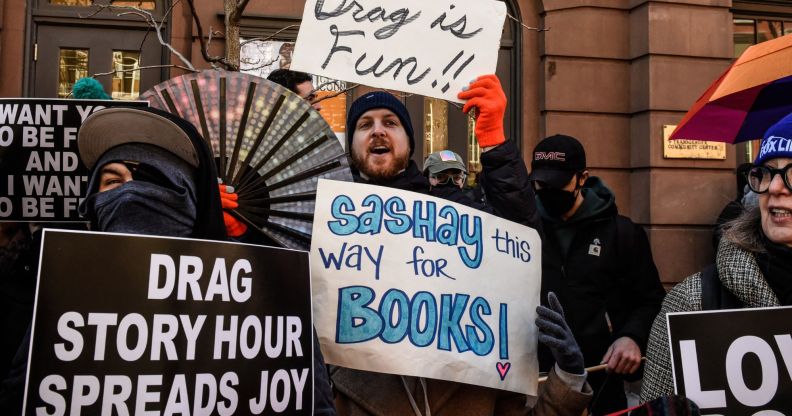Restraining order on Tennessee’s oppressive drag ban extended

The restraining order on Tennessee’s drag ban has been extended until May 26. (Getty)
A federal judge has extended the temporary block placed on Tennesee’s “vague and overly-broad” drag ban.
Judge Thomas Parker ruled to block Senate Bill 3 at the end of March, deeming the statute too broad to be enacted. Without this intervention,
Tennessee’s oppressive drag ban – the first anti-drag bill to pass through US state legislature – would have come into effect on 1 April.
Now, the judge has moved to extend the restraining order on Senate Bill 3 until 26 May.
Memphis-based theatre company Friend of George’s – who brought the suit against Tennessee’s drag ban – announced the extension on Wednesday (5 April) and vowed to continue their fight against the “unjust law”.
Senate Bill 3, proposed by Republican senator Jack Johnson in November 2022, would prevent “adult-oriented businesses” that show “adult cabaret performances” from operating within 300 metres of public schools, parks or places of worship.
It defines these performances as shows that feature “male or female impersonators who provide entertainment that appeals to prurient interest”.
The definition is so vague that, if implemented, it would ban multiple plays, certain parts of Shakespeare and, in some cases, pantomime from being performed.

On 31 March, Judge Parker ruled that if Tennessee Republicans wish to restrict these performances, they will have to do so “within the constraints and framework of the United States Constitution”.
In his conclusion, Judge Parker continued: “This court finds that, as it stands, the record here suggests that when the legislature passed this Statute, it missed the mark.”
His main criticism of the bill – aside from its vague definition of what is clearly meant to define drag shows – is its conflict with the First Amendment.
“Does a citizen’s private residence count? How about a camping ground at a national park?” he wrote. “Ultimate, the Statute’s broad language clashes with the First Amendment’s tight constraints.”
In response to the initial block on Senate Bill 3, LGBTQ+ nonprofit GLAAD commended the decision on Twitter, affirming that drag is art and is “here to stay.”
“Thank you [Friend of George’s] and all drag artists, LGBTQ+ people, and allies in Tennessee who have been speaking out against this disgusting and discriminatory ban.”
How did this story make you feel?

